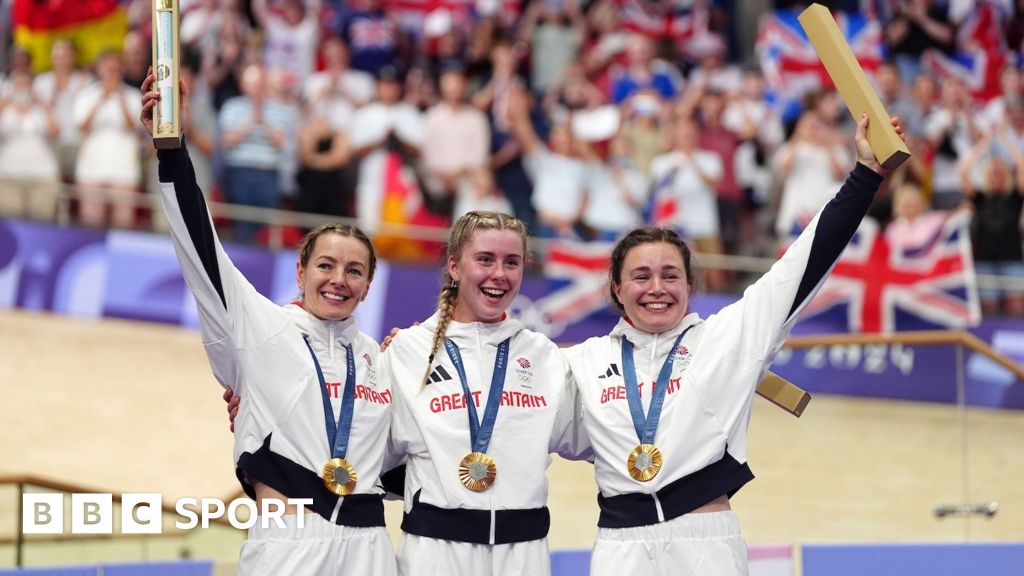This video can not be played
To play this video you need to enable JavaScript in your browser.
Emma Finucane, Sophie Capewell and Katy Marchant kick-started the medal charge in the Paris velodrome by winning Great Britain’s first Olympic women’s team sprint gold.
They set a new world record – for the third time in the session – of 45.186 seconds to beat New Zealand.
It is the first time Britain has won a women’s team sprint medal, of any colour, at the Olympics.
“To break three world records and come away as Olympic champions, we just absolutely nailed it and I’m so proud of us,” 31-year-old Marchant told BBC Sport.
Finucane added: “It just feels unreal to even say we’re Olympic champions, and standing up on the podium with these two, I just felt so content.
“We smashed it, and I know how hard we’ve worked back home. All those tears we’ve cried, all those moments our legs have been hurting, it’s all been worth it.
“No-one can take this off us now. We’re always going to be Olympic team sprint champions. I can’t believe I’m saying it.”
The British trio started how they would go on at the Saint-Quentin-en-Yvelines velodrome by shaving 0.15 seconds off the previous world record in qualifying.
In hot, fast conditions, that time tumbled further, with first Germany, then New Zealand eclipsing it, before Finucane, Capewell and Marchant brought it back into British hands in 45.338 secs to secure their place in the gold-medal race.
Against New Zealand they trailed after the first lap but, roared on by the huge number of British fans inside the velodrome, they turned the tide as Finucane crossed the finish line 0.473 secs ahead of Ellesse Andrews on the opposite side of the track.
Earlier, Germany beat the Netherlands to bronze.
More medals are on the horizon, with 21-year-old Finucane – seen as the next sprinting superstar – set to contest both the keirin and the individual sprint, the event in which she is the world champion.
Capewell, 25, is due to also race in the individual sprint, while Marchant – a bronze medallist from Rio 2016 – will contest the keirin.
Changing fortunes for GB’s sprinters
Great Britain did not even qualify for the women’s team sprint at the Rio and Tokyo Olympics, while at London 2012 – the first time the event was added to the programme – Victoria Pendleton and Jess Varnish were disqualified from the final.
It was in 2019 that the British squad made a pact to “change the narrative”.
They had had enough of being the “tag-along squad”, the “weakest link” in the British Cycling machine after an era around the London and Rio 2016 Olympics when sprint medals were not sparse thanks to the likes of Pendleton, Varnish and Becky James.
Then came the drought. From 2017 to 2020, Britain’s female sprinters won no medals at World Championship level, and only one – a team sprint silver in 2020 – at the Europeans.
At the postponed 2020 Tokyo Olympics, held in 2021, Marchant was the sole female sprinter in the Team GB squad and came home empty-handed.
But it was around that time that she started to notice changes. More work was being done to bring female sprinters through the system into an elite squad that was thin on numbers.
After Tokyo, in came a new coach, Australia’s four-time world champion Kaarle McCulloch. Her arrival brought with it renewed confidence in and among the athletes, and a feeling that they finally had a voice at the table.
Under McCulloch and now new coach Scott Pollock, that has paid dividends. Finucane has the world champion’s rainbow jersey, while Marchant – who took time away to have her son, Arthur, in 2022 – is the 500m time trial European champion. With Capewell, the trio topped the world rankings coming into Paris.
In the French capital their execution was nigh-on perfect, securing Team GB’s 11th gold of the Games on the first night of action on the track.
Capewell, who lost her father, Nigel – a two-time British Paralympian – in 2021, said: “The support, the journey to get here, I’ve had my own personal battles and I wish my dad could have been in the stands watching me, but I know he was proud of me.
“It didn’t feel real all day, we just did every ride and ‘oh faster, oh faster again’.”
Speaking after receiving their medals, Capewell added: “This team sprint has been almost the bane of our existence. We’ve known we have the talent here, there and everywhere, and it never seemed to come together.
“This project is no longer a project. We’re going to need a new one.”
Related Topics
-
-
37 minutes ago

-
-
-
26 July

-

